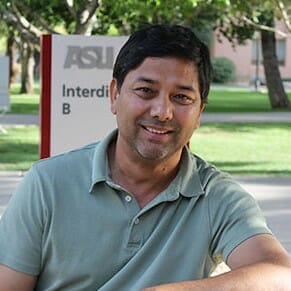
In this series, we’re sitting down with the Swette Center affiliated faculty to catch up on food systems, innovation, and what makes a good meal. See the rest of the series on our Food Systems Profiles page.
Read on for an interview with Netra Chhetri, Senior Global Futures Scientist, Julie Ann Wrigley Global Futures Laboratory & Professor, School for the Future of Innovation in Society, College of Global Futures.
How did you get interested in food systems issues?
My interest in food in general comes from my background in farming and my undergraduate degree in agriculture. These two experiences have come together as a way of life for me. After living in the US (since 1997) I have observed that access to food is less of an issue for many, but the quality of food may not be great. In other parts of the world access to food may be an issue while the quality of food is usually good because they have much more diversity and freshness. When I compare access and quality, both are equally important for a healthy life, but none of the world seems to have been able to balance them both. I’m greatly concerned about this and this is another reason why I am interested in food systems.
Share a glimpse of your current research and how it applies to food systems transformation.
I work largely in South Asia for my food systems research. Since climate change is an accepted reality with consequences now and in the future, some of my work involves finding ways to respond to changing climate. Most smallholder farmers around the world deal with more than one agricultural entity in their life. They usually have a few animals and a small piece of land, grow vegetables in their backyards, some cereals in their main fields, and so on. Any agricultural waste goes to animals as feed and in return animals provide manure to fields. This way of farming circles back nutrients and doesn’t waste anything. This system has been experiencing transformation lately, largely due to globalization and climate change. I try to understand what is happening to this system and what can be done to increase the resilience of this system so it continues to serve its purposes. I also do some applied innovation research, such as the introduction of solar irrigation and biochar into the system. Solar irrigation provides a buffer for the vagaries of the climate and biochar helps to improve the quality of the soil. Through my research I am hoping to contribute to the food system of these smallholder farmers. I also have a proposal under review right now to work with Navajo Nations here in Arizona.
What’s an innovation in the food systems world that you’re excited about?
I’m not particularly excited about any current food systems innovations because none of them are getting to the root causes of our problems. In order to transform the food system, a significant percentage of our population has to go back to being stewards of the land. This has been a struggle because there is no incentive to return back to the land. We need to engage more with ecology and land, and see the food system through the lens of the environment. There needs to be more policy innovations to incentivize farmers to take interest in maintaining the ecology and the land. I haven’t seen anything like that yet, but I’m always optimistic.
What’s your go-to weeknight meal?
I usually eat a lot of salad. These days I’m also eating a lot of pumpkin and sweet potato. Occasionally I eat fish. I also love lentil soup and rice – which is a staple food for me.